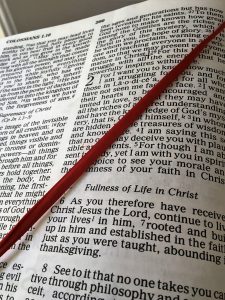Amos 1:1-2
The words of Amos, who was one of the sheep breeders from Tekoa—what he saw regarding Israel in the days of King Uzziah of Judah and Jeroboam son of Jehoash, king of Israel, two years before the earthquake. He said: The Lord roars from Zion and makes his voice heard from Jerusalem; the pastures of the shepherds mourn, and the summit of Carmel withers (CSB).
Amos is a very neglected book of the Bible. However, our neglect does not detract from its value. All Scripture is God-breathed and is profitable (2 Tm 3:16). Amos is a strong message to unrepentant sinners, yet it contains a message of hope at its end. In some ways we might compare Amos to John the Baptist.
We need to remember the time of the message of Amos. It was given in the old covenant era, and he speaks faithfully to the people in conformity with the terms of that covenant. Compare Exodus 19:3-6; Deuteronomy 7:9-11; 28:1-68. Yet the book of Amos is highly relevant to us, because it tells of the judgment of God, the failure of people, the grace of God, and the difficulty of the task confronting God’s faithful servants.
Let’s begin with the setting of the prophecy (1:1). What do we know about the human writer?
- His occupation—Amos was a shepherd, like Moses and David. He was not from the “schools of the prophets”, but he came from outside the usual religious institutions. He may have been rich or poor; we are not told much about him. He was already busy; God uses people who are in motion. One thing is clear: he knew God and his message. We should accept or reject ministers on the basis of the correctness of the message they teach and the godliness of the way they live (1 Timothy 4:16). Other matters are far less important.
- His home—Amos was from Tekoa of Judah, which was six miles southeast of Bethlehem and eleven miles from Jerusalem. However, God sent him to minister to the northern kingdom of Israel.
And what of the time and character of the time of his ministry? Here are some general facts about the time in which Amos lived. Jeroboam II was king of the northern tribes (2 Kings 14:23-29). He was an evil leader, but was used by the Lord to help his people. Wicked people can be used by the Lord to help the children of light. Uzziah reigned in the southern kingdom (2 Chronicles 26:5-15). He followed the Lord and greatly strengthened the kingdom of Judah. Yet, he became arrogant, and was punished by the Lord.
Thus it was a time of power and prosperity for the kingdoms in general, but not for all the people, as we shall see, God willing. It was also a time of indulgence, idolatry, immorality, and injustice. (Sounds like twenty-first century America, huh?) Israel had a form of godliness, but denied its power (2 Timothy 3:5). For God’s old covenant people, it was like an Indian summer before the final descent into winter.
Specifically, this prophetic message was given two years before the earthquake (cf. Zechariah 14:5). This was a notable event, spoken of long afterward. Catastrophes alone do not produce repentance, but anger against God. Americans as a whole have not turned to God after six months of the Covid-19 pandemic. People are not seeking God. Churches have only a fraction of people attending that they had last year. Christianity is considered irrelevant by most. Christians are powerless, when we should be people of hope. Pray for grace, not judgment if you are truly concerned about our land. It is time for every Christian to seek the Lord and repent.
Amos was one of the first of the writing prophets. He was a contemporary of Jonah and Hosea. Like we stated previously, he ministered to the northern kingdom, which followed the heresies of Jeroboam I (1 Kings 12:26-33). They had forgotten God and replaced his worship with outright idolatry at this point (Hosea 13).
God did not send Amos on an easy mission. The Lord can put his faithful in tough situations, but in such circumstances the light looks brighter against the darkness. We do not minister in colonial America or during the post World War II boom. We are in different times. But tough times bring their own opportunities to serve God.
Grace and peace,
David

 The earth is the Lord’s, and everything in it, the world, and all who live in it; for he founded it on the seas and established it on the waters (Psalm 24:1-2 NIV).
The earth is the Lord’s, and everything in it, the world, and all who live in it; for he founded it on the seas and established it on the waters (Psalm 24:1-2 NIV). John 14:22-26; 16:12-15
John 14:22-26; 16:12-15 2 Peter 1:20-21
2 Peter 1:20-21 2 Peter 1:20-21
2 Peter 1:20-21 Matthew 22:15-40
Matthew 22:15-40 They are more precious than gold, than much pure gold; they are sweeter than honey, than honey from the honeycomb. By them your servant is warned; in keeping them there is great reward (Psalm 19:10-11 NIV)
They are more precious than gold, than much pure gold; they are sweeter than honey, than honey from the honeycomb. By them your servant is warned; in keeping them there is great reward (Psalm 19:10-11 NIV) The law of the Lord is perfect, refreshing the soul. The statutes of the Lord are trustworthy, making wise the simple. The precepts of the Lord are right, giving joy to the heart. The commands of the Lord are radiant, giving light to the eyes. The fear of the Lord is pure, enduring forever. The decrees of the Lord are firm, and all of them are righteous. They are more precious than gold, than much pure gold; they are sweeter than honey, than honey from the honeycomb. By them your servant is warned; in keeping them there is great reward (Psalm 19:7-11 NIV).
The law of the Lord is perfect, refreshing the soul. The statutes of the Lord are trustworthy, making wise the simple. The precepts of the Lord are right, giving joy to the heart. The commands of the Lord are radiant, giving light to the eyes. The fear of the Lord is pure, enduring forever. The decrees of the Lord are firm, and all of them are righteous. They are more precious than gold, than much pure gold; they are sweeter than honey, than honey from the honeycomb. By them your servant is warned; in keeping them there is great reward (Psalm 19:7-11 NIV). The law of the Lord is perfect, refreshing the soul. The statutes of the Lord are trustworthy, making wise the simple. The precepts of the Lord are right, giving joy to the heart. The commands of the Lord are radiant, giving light to the eyes. The fear of the Lord is pure, enduring forever. The decrees of the Lord are firm, and all of them are righteous. They are more precious than gold, than much pure gold; they are sweeter than honey, than honey from the honeycomb. By them your servant is warned; in keeping them there is great reward (Psalm 19:7-11 NIV).
The law of the Lord is perfect, refreshing the soul. The statutes of the Lord are trustworthy, making wise the simple. The precepts of the Lord are right, giving joy to the heart. The commands of the Lord are radiant, giving light to the eyes. The fear of the Lord is pure, enduring forever. The decrees of the Lord are firm, and all of them are righteous. They are more precious than gold, than much pure gold; they are sweeter than honey, than honey from the honeycomb. By them your servant is warned; in keeping them there is great reward (Psalm 19:7-11 NIV). The heavens declare the glory of God; the skies proclaim the work of his hands (Psalm 19:1 NIV).
The heavens declare the glory of God; the skies proclaim the work of his hands (Psalm 19:1 NIV).